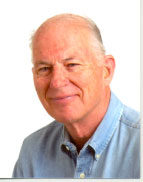 Patrick McKee has been teaching at Colorado State University since 1964 and, to this day, believes that he has the best job humanly conceivable.
Patrick McKee has been teaching at Colorado State University since 1964 and, to this day, believes that he has the best job humanly conceivable.
After receiving his undergraduate degree from Gonzaga University in Spokane, he moved across the country to obtain his Ph.D. in Philosophy from the University of Maryland. By August 1964, McKee was happily situated in the Department of Philosophy at Colorado State, working as a professor.
McKee started his journey through higher education as a student of psychology. But as he approached his junior year, he began to realize that the questions that called to him — questions of perception and the nature of the mind — were really philosophical questions rather than questions of human behavior. His initial philosophical musings began while most of his peers were deeply entrenched in braces and homecoming.
“I remember being in my high school’s library reading Nietzsche, and when it came time to turn the book in, one of the teachers who knew a lot of about philosophy thought he would quiz me on what I had read. And he thought I did a pretty good job reporting back, so I started to think that maybe I could do this,” he said humbly.
Perception and the human mind
McKee’s areas of interest revolve around questions of perception and the nature of the human mind, an interest that developed in graduate school. He started to work alongside a professor who specialized in these areas, and wrote his dissertation on philosophical problems of perception.
One such problem, which caught McKee’s interest early on, is known as synesthesia, a phenomenon where stimulation of one sense produces an experience in another sense — hearing colors sounds, for example. McKee also teaches and studies areas of metaphysics. And while these subjects may appear disparate, a common theme in McKee’s areas of interest is their inherent inability to be answered concretely.
“Philosophy usually takes on questions that we don’t know how to answer,” he said. “If we knew how to answer them, then we’d hand them over to scientists to treat the issue methodically and systematically. But there are some questions that, so far, nobody knows how to approach in a scientific way. The way you go about thinking about those questions is to subject our thinking — or most of it, anyway — to logical rigor. Because if we knew a way to answer the question definitively, we’d probably stop thinking about it.”
If one thing is certain, it’s that McKee has undoubtedly not stopped thinking; his intellectual interests continue to evolve and deepen as he spends more time in the department. In his time with the University, McKee has taught most of the philosophy courses offered, but maintains that whichever is his favorite depends on the decade it is being taught in. Currently, McKee enjoys teaching Philosophy of Art, due to his personal affinity for painting, and his interest in the overlap between art, perception and the theory of knowledge.
“My current interest is in whether or not paintings are effective vehicles for expressing knowledge; whether they convey insights that are valuable,” he said. “And I tend to think that they do.”
McKee, a self-proclaimed perpetual student, enjoys the time he spends studying and producing paintings. He participates in many local painting exhibits and competitive art shows, as well as week-long workshops to develop his skills. Often, as his peers discover his tenure in the study of philosophy, McKee will give impromptu talks about his studies. One such talk was recorded for a video that was distributed nationally.
Two focusing events
And just as his interests have transformed, he has witnessed a lot of change during his 50 years with the University. For McKee, there have been two major focusing events that have fundamentally changed the nature of the student body: the upheaval in the 1960s, and events of Sept. 11, 2001. From where he sits — from an admittedly elevated perception of student performance — both of these events served to increase the seriousness, social consciousness and maturity of the student body.
“It wasn’t that every student had changed, but on balance, the attitude of the student body changed in that way,” he said. “These things had the effect of foreshortening the myth of eternal adolescence.”
While McKee remains extremely humble about his 50 years’ worth of accomplishments, his impact on the department has been tremendous. He served as the chair of the department for eight years, developed the first course that was intended to be disseminated to large sections and created an endowment for the department.
McKee reveals a passion for his work, and is continually energized by his area of study.
“I like it all. I like my teaching a lot, and the more I do it, the more I like it. But I also like learning, and I’m still basically a student. I take a lot of time to read and study, I don’t think I have a favorite part, but it’s a very enjoyable way to live. If someone were trying to determine the best form of human employment, they would probably come up with my job.”
We thank McKee for his 50 years of dedicated service to Colorado State University!